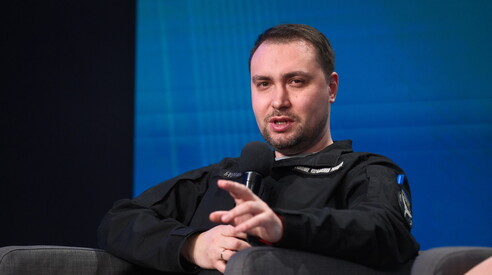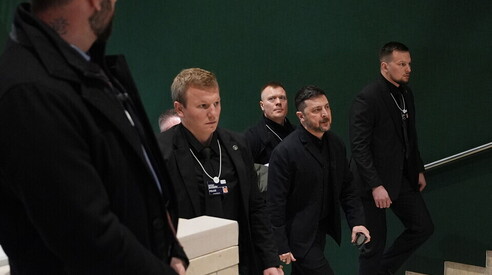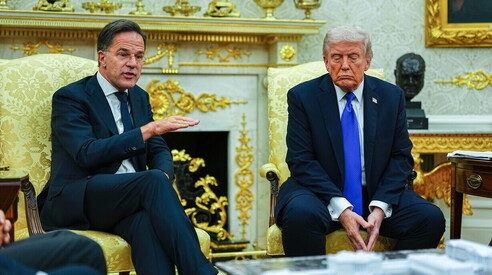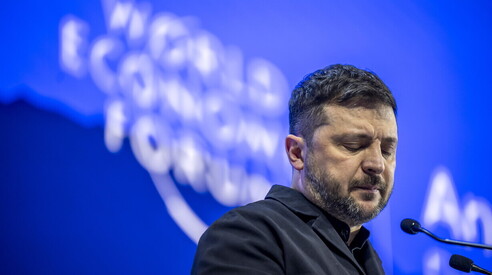
(foto di Vitalii Nosach/Global Images Ukraine via Getty Images)
Exclusive
"Here we make Ukraine or we die", Kyrylo Budanov tells us
Paraphrasing Giuseppe Garibaldi, the Head of Ukraine’s Defence Intelligence tells Il Foglio that Russia’s “total blackout” strategy and the drones now flying over European skies are designed to fracture the unity of Ukraine’s allies and the spirit of Ukrainians themselves
The office of Kyrylo Budanov, the head of Ukraine’s defence intelligence, is dark: lights off, blinds down, the only illumination – dim – comes from a screen mounted on the wall turned in front of his desk covered with books and folders. Despite the Russians having tried to kill him many times, Budanov continues to work here, in the headquarters of the secret services, on the peninsula between Kyiv and the Dnipro, the river that crosses the Ukrainian capital: the only tribute to secrecy is the darkness in which this thirty-nine-year-old lieutenant general immerses himself, who has worked in intelligence since 2007, has been wounded three times in combat after 2014 and, from time to time, personally takes part in military operations.
Budanov does not like formalities or frills, he has a reputation for being laconic, his collaborators tell us: short and precise questions, he always goes straight to the point. We begin immediately with Vladimir Putin’s strategy for the winter, the fourth after the large-scale invasion of Ukraine: on the night before our meeting, the siren signaling the arrival of Russian missiles and drones sounded three times in Kyiv, the explosions were heard in the center of the city, a power plant was attacked that left parts of the capital without light for the entire following day, and in a village of the region a house where a thirty-eight-year-old mother lived: she was killed together with her six-month-old daughter and her twelve-year-old niece. Shortly before our meeting, in Kharkiv, the Russians struck in broad daylight a kindergarten in which there were forty-eight children: the teachers managed to bring the children quickly into the shelter and saved them.
“It is not a secret that the Russians want to cause a total blackout in Ukraine,” says Budanov, “for the following reason: according to their idea, these attacks have an impact on the socially unprotected layers of the Ukrainian population. People with medium and high income now have at their disposal all kinds of useful devices to withstand a blackout, the inverters and the batteries, and some even have private generators with which to heat and illuminate their own house. Military and government structures are also equipped for quite some time with generators, but the people hit by the Russian attacks belong to the socially unprotected layers, who have a lower income. The Russian leadership wants to obtain a total blackout because it believes in this way to create a social discontent inside the country.” This is the dominant theme of our conversation: Putin wants to destroy not only Ukraine, but the entire support for Ukraine, that of the Ukrainians and that of its allies. Many times Budanov will tell us that the most important thing, the concern and at the same time the greatest strength of Ukraine, is unity: without it, the war is not won.
Kyiv has changed the way of making war, ingenuity, innovation and strategy have allowed Ukraine to hold the line of the front and to strike military and strategic targets on Russian territory with the deep strikes. In recent days, the Ukrainian defense forces have succeeded in striking the chemical plant of Bryansk, which produces gunpowder, explosives and components for missile fuel, and an oil refinery in Dagestan. Budanov tells us that “the attacks in depth are focused in two directions: the first is to paralyze significantly the production of Russian oil and refining, which is one of the main sources of income of the Russian budget. The second line of intervention is, of course, to target and strike the Russian defense industry and the enterprises that produce weapons and equipment for the Russian army.” The difference between the Ukrainian and Russian attacks is evident: “We do not fight in a targeted way against the society of the Russian Federation.”
The Ukrainian deep strikes are already giving results, confirmed by the data on Russian exports of hydrocarbons and oil products. “From the sector of gasoline exports we have almost eliminated them,” says the head of the intelligence directorate of the Ukrainian Ministry of Defense. The success is determined by the fact that the Russian air defense is concentrated along the border, in the occupied Ukrainian territories and in defense of Moscow and Saint Petersburg: “When one surpasses the system deployed along our border, the flight of our drones through the Russian Federation is always without problems,” says Budanov. The subsequent air defense is found in protection of a specific object: “Now the Russian Federation is trying to increase their number, but the volumes are too large to protect everything.” Budanov says he looks at the graphs, the Russians are trying to compensate for the damages “by exporting more crude oil and LNG to balance the revenues of their budget.” As for the attacks on the Russian defense industry, “there are effects, but they are less tangible,” he says. “They are effects more difficult to decipher, because we are creating problems to the rhythm of Russian military production.”
Last week, in a public meeting, Budanov said that the attacks in Russian territory work like sanctions against Russia, reiterating what President Volodymyr Zelensky has also declared: the subtext is that Western sanctions have not been so far sufficient and that the Russian economy is still solid. “The Russian Federation is a very powerful enemy, regardless of what some say and think. I remember very well the opinions that influential Russian military figures had in February 2023,” says Budanov, quoting them: “We believed we had a very powerful army and a weak economy – they said – but we discovered that the opposite is true.” The Russian economy is still solid enough to continue the war: “I am not referring only to oil, I am speaking of the entire energy resources sector. Now everyone is discussing reducing the dependence on Russian gas, but at the same time the volume of Russian LNG exports is growing to the point of compensating the reduction in gas consumption.” It is precisely the revenues from the energy industry that allow Russia to continue the war, “the help of other countries also counts, allies, certainly, but without the revenues from energy, Russia would not have been able to continue to fight this war. So speaking only in terms of hypothesis, if there had been a true embargo imposed on Russian hydrocarbons and on products derived from hydrocarbons, the general picture would be completely different.”
In these days progress has been made by the allies of Ukraine: on October 22, the United States Treasury Department announced the introduction of sanctions against the Russian oil giants Rosneft and Lukoil, and their subsidiary companies, and the following day the European Union approved the nineteenth package of sanctions, which also includes an “energy blockade.” Before moving on to the unity of the support of the allies, we ask Budanov a specific question, as he likes: does American intelligence help Ukrainian forces in the deep strikes? Here he is, the laconic Budanov: “We are all part of this process,” he answers.
During the summer some sources of Il Foglio said that the ceasefire was near: it was not a hope, Ukrainians have learned not to build their strategy on hope but on information, calculations, realism. But the ceasefire did not happen. Budanov confirms that there are possibilities, but explains that many factors must fit together – in Ukraine, in Russia, in the allied countries – and all together: only the exact combination of these elements in a planned moment will give results, otherwise “the war will continue.” Like all Ukrainian leaders, Budanov does not criticize Donald Trump even when he continues to feed the illusion of a possible negotiation with Vladimir Putin: this composure, once again, is part of an approach that is not based on hopes nor on complaints, but on realism. “Whether we like it or not, for the United States Russia and China are world powers. Russia is nothing from an economic point of view, but it has military power; China is both things, an economic and a military power. And America does not want to worsen its own position in any sense, it cares mainly about its own interest, America first, and we must take this priority into account. If you are asking me: do we like it?, the answer is obvious. But for them it is America first and we cannot avoid dealing with it. However, we must not forget another thing: without the support of the United States, who knows what would already have happened here with us.”
Meanwhile Trump’s momentum towards Putin, from the phone call of October 16 to the preparation of the summit between the two in Budapest, has already evaporated: “Every time I speak with Vladimir, we have good conversations, but they lead nowhere,” said the American president in one of his (very frequent) meetings with journalists at the White House.
Trump’s proposal coincides with that of many European leaders: to stop the conflict along today’s front line. Would it be a good result for Ukraine? In the half-light it is not easy to recognize how and how much Budanov’s expression changes, but while he speaks a dark veil descends in his gaze: “It is difficult to answer this question because its meaning almost falls in the field of philosophy. For me, losing one square millimeter of our land is a bad result. But if you also adopt other points of view, then certainly sparing ourselves thousands and thousands of deaths is a good thing.” We know what the Russians do in the occupied territories, we know of the tortures, of the indoctrination, of the suffocation of every freedom, and that is why for Ukrainians it is painful, unbearable, to have to condemn other Ukrainians to live under the Russian regime. But then there are the lives to save.
We start talking about Europe, about the Russian attacks against our countries, the so-called “hybrid war” that includes sabotage, cyberattacks, drones and military aircraft in our skies: what does Putin want to obtain? “This answer is easy,” says Budanov, the dark veil has disappeared, “in military science this type of attack is called ‘reconnaissance through combat’,” and the objectives are two, indeed three, even if one is more psychological, and is for internal use: “Putin is preparing the Russians, he wants to destroy, in their heads, the idea that Europe is worth something, that Europe is strong.” The drones in our skies have a practical objective, which concerns Europeans: “The Russians are testing your reaction, your capacity to make decisions, your will to use force. Meanwhile they do reconnaissance, they detect your systems, they understand how they work and where they are positioned.” It is a double test, in short, political and military. “But if we take everything together, the drones, the sabotages in factories and railways, the cyberattacks, we see that the objective of the Russians is to unleash a feeling against the war in European countries and in your public opinions. For them the advantage is double: if you Europeans cannot stand the war anymore, the aid that arrives to us, to Ukraine, is reduced. And meanwhile the Russians sow the idea among European peoples that one should not at all get to fighting against Russia. It is not I who say it, it is the Russian opinion about it.”
And how is Europe responding to this double test, how does he judge the reaction? Budanov’s answer is a laugh. Full, spontaneous. We move to the next question, he says, the cold, aloof and taciturn Ukrainian agent keeps smiling. We then ask him how Ukraine can help Europeans to defend themselves, since alone they do – we do – make one laugh: “Theoretically, we can help you, but as long as the war continues, our capacity is rather limited. This question concerns the future and concerns the change of the security architecture in Europe. From the geographical point of view, the answer is obvious: it is advantageous for everyone to make Ukraine as strong as possible, so that it serves as a buffer or as a shield or whatever you want to call it. Thus, Europe would save itself, otherwise, you heard earlier the laugh. At the moment we are giving help by sharing our defense experience,” but if Russia were to become more active – and it is preparing – then a whole other response would be needed from Europeans.
It should be clear at this point that it is in the interest of the allies the strengthening of Ukrainian defense, and according to Budanov this is directly dependent on maintaining unity, on the collective and lasting support of Ukraine’s allies. “The first thing we need is to preserve the unity of the world in supporting us, and this is, among other things, the most complicated thing. If there is unity, then the questions regarding financial support, material support such as equipment, and perhaps even direct military support are negotiable and can be resolved, they will simply transform over time,” but if unity is not there, everything breaks, because “external unity is reflected on internal unity here in Ukraine, in our society. So if support is powerful and united, even Ukrainians feel it and the unity that still exists in our society is cemented. And let’s be honest: in these conditions, no one can defeat us.”
We finish our conversation talking about Italy. Budanov says that Ukraine continues to need above all the Samp/T air defense systems, “we have at our disposal a low quantity, at a critical level, of these missiles.” Everything is needed, a lot is needed, Italians should understand it, know it, feel it. “I will quote one of your national heroes,” says Budanov, “Giuseppe Garibaldi, who said: ‘Here we make Italy or we die,’” quoting the words Garibaldi said in Calatafimi in 1860, to give courage and strength to his men in a critical moment. “Here, this applies also to us, ‘here we make Ukraine or we die,’” says Budanov, who is a Hero of Ukraine, he was awarded the Gold Star in 2024 by Zelensky for his personal courage and for his heroism in the defense of Ukraine.
The director of intelligence stands up, now the paintings, the photographs, the statuettes, the diplomas, the books and his face become visible: he has turned on the light.





